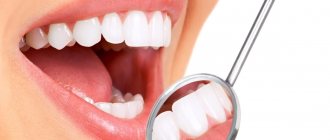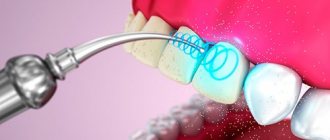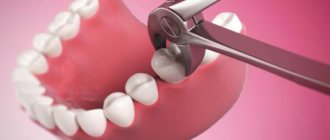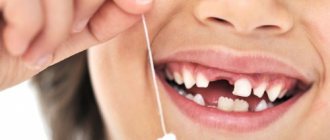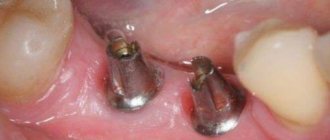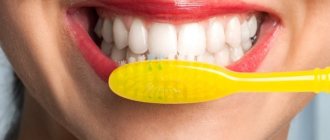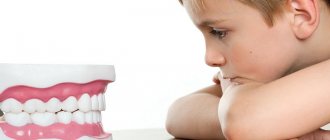Dentophobia is the fear of visiting a dentist. Almost 20% of the population experiences it. A person gets very worried when he sees a doctor, refuses treatment, and seeks help only as a last resort. It is difficult for such patients, because they may faint during the appointment. To see a doctor, they have to take sedatives, which also affects their health. How to overcome fear of the dentist?
Woman with dentist tools
Types of dentophobia
The psychological problem is divided into several types. They are distinguished in modern psychology into:
- Hereditary. There has now been research done that says there are people with elevated pain thresholds. This is laid down at the genetic level. After visiting the dentist, such a patient is in great pain, even under anesthesia.
- Acquired. In the course of life, every person needs to see a dentist. Not all doctors are able to perform all procedures accurately and painlessly. After visiting an “inept” doctor, all doctors seem scary.
- Fantasized. This happens due to a person’s easy suggestibility. Acquaintances, neighbors or the media tell stories in which a patient died due to an anesthesia injection during dental treatment. After this, fantasy builds fears.
Important! Most often, fear of the dentist is an acquired problem.
How to minimize the number of visits to the dentist
Psychology experts recommend that all those who have similar fears do everything possible to minimize the number of trips to the dentist. To do this, you need to carefully monitor the condition of your oral cavity.
In order for your teeth to remain in good condition for a long time, it is necessary to clean them regularly and properly (2 times a day). Many dentists also recommend periodically using dental floss to remove food debris from hard-to-reach areas of the mouth.
Incredibly, for those who often say the words: “I’m afraid to go to the dentist,” dentists recommend making preventive visits to specialists more often. This way, the doctor will be able to detect problems that have arisen at the initial stages of their development, and treatment will be as painless as possible.
In addition, visiting the doctor will become a habit and become routine. Therefore, a person will no longer say: “I’m afraid of dentists. What to do?"
Psychologists advise arranging entertaining activities for yourself after a visit to the doctor - this will be some kind of encouragement for taking such a decisive step.
Reasons for being afraid of the dentist
How to develop speech and learn to express your thoughts beautifully to an adult
Dentophobia applies to both adults and children. Each of these population groups has its own reasons for the development of the problem. In adults this occurs due to:
- Bad appointment at the dentist. After visiting an inexperienced, rude or careless dentist, you don’t want to feel pain and trouble again. Overcoming a phobia is not very difficult.
- Fear of blood and white coats. Often, during the treatment of dental diseases, blood is released from the oral cavity; the patient may faint at the reception only at the sight of it. Learning to go to the doctor is possible only after a course of treatment with a psychologist.
- Fear of pain that occurs during treatment. People with a high pain threshold are afraid of even the slightest pain. To them it seems piercing.
- Psychological abnormalities. There is a category of sick people who have a pathological fear of the hospital and people in white coats. In this case, you need to undergo treatment with a psychotherapist.
- Reluctance to show advanced caries to the doctor, for fear of causing his negative reaction. You shouldn’t be afraid of this - doctors examine many oral cavities every day, and you can hardly surprise them with anything.
- Women do not always agree to see a male doctor. They don’t want to lose their appearance and lie with their mouth open.
- Suggestions that visiting the dentist is very scary. Usually this is driven into the head after communicating with friends, neighbors, and loved ones, who vividly describe how painful it was for them and how poorly the procedure was performed.
Important! Before visiting the dentist, take a sedative.
Boy at the dentist
Children's fear of dentists has almost the same reasons. However, in children the psyche is less stable, and this condition is more difficult to deal with. Every child from the age of six months needs to visit a dentist as a preventive measure, since baby teeth are not as strong as molars, and children more often eat sweets and are susceptible to the development of caries. The main causes of childhood dental phobia are:
- Too frequent visits to the dentist and treatment. This usually happens because children don't brush their teeth well. Then problems arise that require treatment.
- There are parents who scare their naughty kids with evil dentists who will come and pull out all their teeth for bad behavior. You shouldn’t do this - at a young age, imagination is well developed, after which it is difficult to convince a child otherwise.
- Sick children, as a rule, are more afraid of visiting a clinic or hospital, since they already know that an unpleasant manipulation awaits.
- The appearance of the drill for small patients seems terrifying.
- Just like in adults, in childhood it is possible to develop psychological deviations in which children are afraid of blood and white coats, but they cannot always explain this correctly.
- An increased pain threshold makes you fear dentists, especially after visiting a doctor and undergoing several similar procedures.
Important! Children who are busy watching cartoons during treatment are more able to tolerate therapeutic procedures.
About dentophobia
All children are very afraid of dental treatment, and over the years this can develop into a serious mental problem.
Dentophobia is a common fear, despite the fact that dental clinics today do everything possible to make the visit to the doctor quick, smooth and painless. On the one hand, we can say that the roots of this phobia go back to the times when dental treatment was really very painful. On the other hand, psychotherapists are confident that it is not even the pain syndrome that comes to the fore, but the general feeling of helplessness that the patient experiences in the dental chair.
Regardless of the reasons, fear of dentists is potentially dangerous both for the patient’s psyche and for oral health, because people with such fear ignore preventive visits to the dentist and often develop dental diseases.
As a rule, fear begins in early childhood, when the child first undergoes a preventive examination. The task of parents is to notice alarming symptoms in time and take appropriate measures, otherwise fear may remain in adulthood, significantly worsening a person’s life.
Signs of violation
It would seem that an adult should be able to control his emotions, including when visiting a doctor. There is, of course, little pleasant in a dental examination, but the discomfort can be tolerated for the sake of strong teeth and a beautiful smile. This is what any adult thinks, but with dental phobia, controlling one’s own feelings and emotions at a dentist’s appointment becomes an impossible task for a person.
Anxiety symptoms of a phobic disorder can occur in three situations:
- directly during the inspection;
- when making an appointment with a doctor;
- when thinking about going to the dentist.
If fear arises only during the examination, when the patient has already sat down in the chair, this is the first stage of dental phobia, which is easier to cope with. If anxiety arises even at the thought of the need for an examination, it’s time to sound the alarm and sign up for a consultation with a psychotherapist.
Dentophobia refers to object phobias, therefore it has quite standard manifestations. Object phobias are called phobias that arise upon contact with one object or subject, in this case, with a dental chair or dentist.
The person experiences uncontrollable horror and may even lose consciousness
This phobia manifests itself with mental and physical symptoms. Mental manifestations include:
- feeling of irrational uncontrollable fear;
- feeling of panic;
- desire to leave the doctor's office as quickly as possible;
- uncontrolled actions and movements;
- aggression towards the doctor;
- feeling of helplessness;
- derealization.
The key symptom is uncontrollable fear. In other words, a person not only feels anxiety, but experiences real horror, and these emotions cannot be hidden or closed off.
People with this phobia experience an obsessive desire to escape from the doctor's office.
The physical symptoms of phobia are also varied. Typical manifestations:
- muscle hypertonicity;
- tremor of fingers;
- feeling of lack of air (shortness of breath);
- feeling your own heartbeat;
- headache;
- dizziness and nausea;
- confusion.
These symptoms resemble a panic attack and are associated with an increase in stress hormones. In severe cases, patients describe their condition as fainting and complain of cramping abdominal pain and blurred vision.
Causes of fear
Watching specific films in childhood can trigger the development of phobias
The causes of dental phobia, as well as any other pathological fear, are very diverse. These include:
- childhood trauma;
- hereditary predisposition;
- features of upbringing;
- painful procedures in hospitals;
- excessive impressionability;
- neurosis.
Childhood psychological trauma is the most common reason for the development of fear of dentists. For example, in some countries children believe in the Tooth Fairy. When a baby tooth falls out, babies put it under their pillow, expecting a reward from the fairy. Lack of reward, ridicule from parents or older brothers or sisters - all this can cause the development of fears of any dental manipulation. As a result, in adulthood, childhood resentment transforms into a real phobia.
Another reason may be the characteristics of upbringing. Some adults scare children with doctors, for example, when they refuse to brush their teeth. If a child is often told “if you don’t brush your teeth, the doctor will pull them out,” a phobia begins to form in childhood, which becomes a real problem in adulthood.
Heredity plays an important role in the occurrence of phobias. So, if one of the parents is afraid to go to the dentist, the child takes on this fear and over time he also develops a phobia. This is primarily due to children copying the behavior of adults.
In some cases, fear of the dentist or dentist is part of a phobia of any doctors. This occurs if a person has undergone some unpleasant manipulations in the clinic. As a result, he is wary of all people in white coats, and over time, dental phobia may develop.
In addition, fear of dental treatment may be associated with severe stress or neurosis. In this case, a person experiences signs of pathological fear due to an increase in stress hormones.
In adulthood, dental phobia can be part of a chain of complexes. For example, a person has not visited the dentist for a long time due to lack of funds for treatment. If he is initially unsure of himself, he will experience fear of the doctor, associated with the dentist’s reaction to the neglected condition of his teeth. This translates into a fear of being ridiculed because the patient did not have the financial means to go to a dental clinic sooner.
Types of phobias
Before you figure out how to get rid of dental phobia, you should know what types of this disorder there are.
Psychotherapists divide this pathological fear into imaginary and acquired. Imaginary dental phobia is something that happens in children. A person has no real reason to fear dentists, since he has never been to one, and the fear is rather abstract in nature, since an examination by a doctor is perceived as something potentially dangerous and unpleasant. Quite often, imaginary phobias extend to all medical workers - a person will be just as afraid of an x-ray, an examination by a therapist, or a routine blood test.
Acquired phobia of dentists is always a consequence of sad experiences in the past. This happens if a person previously encountered an unscrupulous doctor who ridiculed the condition of his teeth, caused pain, or did not approach the issue of examining the patient with sufficient sensitivity.
Symptoms of dentist fear
How to calm down and stop being nervous and worrying about trifles
Fear of dentists is a phobia, called dentophobia. It occurs equally often in children and adults. Such patients experience:
- panic attacks;
- fainting and loss of consciousness;
- rapid breathing;
- high or low blood pressure;
- nausea, vomiting;
- dizziness;
- fear of going into the doctor's office, even if the pain is unbearable;
- enduring pain in the hope that it will go away on its own;
- children may not admit their problem for a long time;
- confused speech;
- cardiopalmus;
- feeling of fear, horror.
Is it possible to overcome dental phobia?
How not to be afraid of flying on an airplane - what is aerophobia
How not to be afraid of the dentist? It is possible to overcome a phobia, just like other fears. To do this, they resort to psychological techniques. The degree of the disease varies; the greater the fear, the more difficult it is to get rid of it. There is no need to panic if you cannot overcome your fears. Any treatment requires patience and time. The treatment process is different for children and adults. An adult body tolerates the administration of drugs more easily, and the psyche is more stable.
A man is afraid of a doctor
Dental fear in children
Children's phobias are more difficult to cure. For example, sedatives, painkillers and sedatives should not be prescribed to young children. Patients 10, 11, 12, 13, 14, 15 years old can take such drugs according to their own regimen. From the age of 15, tablets are prescribed according to the adult regimen. It’s difficult to explain to kids how not to be afraid of the dentist. In this case, you can help by resorting to psychotherapy.
There are several options for overcoming fear:
- Selection of a permanent pediatrician, to whom the child will get used and will calmly go to appointments.
- Long conversations with the child about how dental treatment is a mandatory procedure, and you need to learn to overcome your fear.
- Watching cartoons during procedures significantly reduces fear.
- Many dentists try to distract their patients with interesting games.
- A few hours before the appointment, they suggest drinking herbal tea based on chamomile, mint and valerian to calm the child’s anxiety a little.
- Instilling in the child that dentists are good and will not cause harm.
Important! You cannot intimidate or try to bribe a child; this does not always work. In the future, he will have to pay for each tooth healed. If you intimidate a child too much, he will simply stop talking about his pain.
Dentist phobia in adults
An adult always evaluates his behavior better than children. He understands that treatment is necessary, but the mere thought of visiting a dentist causes fear and anxiety. How not to be afraid of the dentist? How to stop being afraid of the dentist forever? To correct this, you need to take measures to treat the phobia:
- If you are afraid of blood and white coats, you need to consult a psychologist; only he can find the true cause and eliminate it.
- Take anti-anxiety tablets before visiting the dentist.
- During the appointment, ask to listen to music through headphones to distract yourself and not watch the process.
- Finding a permanent dentist will help you avoid fear.
- Having a TV in front of the dental chair will help you not think about the pain.
- The administration of painkillers causes complete numbness of half the jaw. During the treatment of holes, the patient does not feel anything.
- If you are afraid of death after an injection, it is recommended to find out in advance about the presence of allergies to painkillers used during the procedure.
- Use of sedation. After the procedure, the patient becomes calm and calmly follows all the dentist’s instructions. This allows the entire mouth to be treated at the same time, without having to make a repeat visit. Used in cases where nothing helps.
- If sedation has no effect, then general anesthesia is used. However, it is used only when absolutely necessary, if dental disease poses a danger to the health and vital functions of the patient.
Woman screaming at the dentist
What to do before going to the doctor
In any case, you should not leave your teeth in a sick state. This entails many consequences and complications. How to calm yourself before going to the dentist? Before visiting a doctor, you can carry out several manipulations that will alleviate fear:
- Calming, sedative drugs. They will cheer you up, relieve anxiety and fear. They are produced on the basis of herbs, as well as with a chemical composition. They can be prescribed by a psychologist at an appointment or purchased without a prescription.
- Conclude an agreement on treatment after the sedation procedure.
- Make an appointment with a dentist 14-20 days in advance, so that during this period you can prepare yourself for visiting a doctor.
- Study the procedure process, reviews about the clinic and the doctor in advance.
- Make an agreement with your doctor about listening to music during treatment or watching TV programs.
- Talk to friends who liked the specialist’s appointment and were completely satisfied with the work.
- Visit a psychologist or undergo a full course of treatment for dental phobia.
Important! The most effective option is to find a way to overcome the phobia. This will help you to visit the clinic calmly in the future.
Woman covering her mouth
Facts about fear of dentists
Dentophobia has been manifested in people since ancient times. But it got its name not so long ago. There are some interesting facts about fear of dentists:
- Dental treatment has been carried out for more than 1000 years. The first practices existed in ancient Rome. At that time, ether was used for pain relief. They gave it to the patient to smell, after which he fell asleep.
- Hypnotic treatment for phobias is the most effective. It helps the patient forget about his fear for a long time.
- The phobia most often begins in childhood; the cause is a vivid memory of a toothache that a doctor in a white coat tried to eliminate.
- Children's fears are so strong that they are able to invent the most unusual stories just to avoid going to the appointment. For example, in the USA, a teenager went to see a doctor, but the police brought him home because he said that he had been kidnapped so as not to have his tooth treated.
- Fear of dentists is most often an acquired disease.
- Many patients suffer from phobia, almost 20% of the population. Many people try to overcome it on their own.
- Many people may continue to fear the dentist throughout their lives.
- If you do not treat your teeth out of fear, this will lead to complications that can have consequences not only on the face and teeth, but also spread to other organs and lead to death.
Why is it necessary to fight dental phobia?
A person with dental phobia, as a rule, refuses to go to the dentist even when absolutely necessary. No reasonable arguments have any effect on him: even with severe pain and advanced diseases, he will put off visiting a doctor. But in no case can you fight dental phobia by refusing to visit the dentist. If you do not visit a doctor in time, caries turns into pulpitis, the gums become inflamed to the point of periodontitis, and severely damaged teeth can only be removed. In the Middle Ages, cases of death after complications of dental diseases occurred quite often and there is a logical explanation for this. The lack of proper and timely treatment has a devastating effect on the health of the entire body as a whole: infection in the oral cavity leads to the development of abscesses and sepsis, diseases of the digestive tract, inflammation of the endocrine glands, rheumatism, bronchial asthma and other ailments. Everything in our body is interconnected, so we must definitely look for ways to cope with pathology. Read on to learn how to deal with dental phobia.
How to visit the dentist less often
The less often you need to go to an appointment, the less you will have to rack your brains to get rid of your fear. There is no need for dental treatment if you take proper care of them. To do this, follow a few simple rules:
- Visit the dentist once every six months as a preventative measure.
- Brush your teeth twice a day: morning and evening.
- Use dental floss and mouthwash.
- Limit sweets in the diet.
- They study all the necessary questions about the clinic in which medical procedures are planned.
- Timely treatment of caries is not as painful as in an advanced stage.
Important! Maintaining good personal hygiene will help reduce the number of dental appointments.
A man is afraid of a drill
Dentophobia is a common disease. It happens to children and adults, and it is possible to overcome it. To do this, it is enough to have a permanent trusted dentist and find a good clinic. In more advanced cases of the disease, they resort to the use of sedation and anesthesia, and treatment by a psychotherapist. Most often, this problem occurs in childhood, after an unsuccessful visit to the dentist.
Fear of dentists: today and 10 years ago
The first thing to realize is that since your last visit to the dentist until today, a good hundred innovations have been introduced in dentistry. For example, to treat caries, drilling with a bur may not be required: at its initial stages, the diseased tooth is “cleaned” with a laser or impregnated with an infiltrant (Icon technology).
The drills that modern dentists are equipped with are practically silent and create a minimal level of vibration - so you can forget about a half-hour “sawmill” in your mouth.
There is good news for dentophobes with intolerance to anesthesia: the injection site will be pre-coated with anesthetic gel, and the anesthetic injection itself will be carried out by an ultra-precise computer system (STA). Moreover, they will “freeze” 1 tooth, locally, and not half a cheek, as “in Soviet times.”
Another innovation: virtual excursions on the websites of private clinics. This way you can “walk” through the dentist’s offices, assess your comfort level, choose a dentist, and feel more confident when you come to your appointment.
Computer Anesthesia STA
